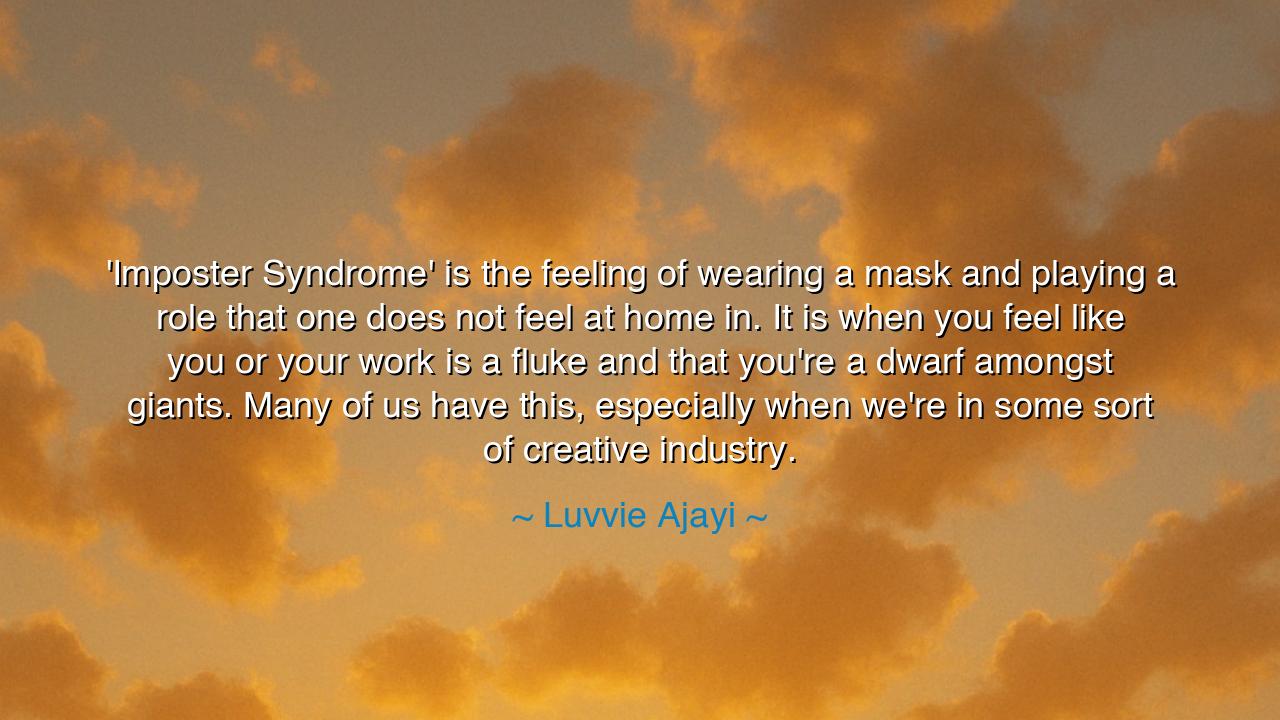
'Imposter Syndrome' is the feeling of wearing a mask and playing
'Imposter Syndrome' is the feeling of wearing a mask and playing a role that one does not feel at home in. It is when you feel like you or your work is a fluke and that you're a dwarf amongst giants. Many of us have this, especially when we're in some sort of creative industry.






In the words of Luvvie Ajayi, a voice both fierce and wise, we hear an echo of a struggle that has haunted humankind since the dawn of creation: “‘Imposter Syndrome’ is the feeling of wearing a mask and playing a role that one does not feel at home in. It is when you feel like you or your work is a fluke and that you're a dwarf amongst giants. Many of us have this, especially when we're in some sort of creative industry.” Her words, though born in the modern age, strike a chord as ancient as the first artist who doubted the worth of their song. She speaks of Imposter Syndrome, that silent thief of confidence, that shadow which stalks even the most gifted among us. Beneath her message lies a truth of timeless weight — that the struggle to believe in one’s own greatness is not a flaw, but a part of the human condition.
Since the earliest days of creation, those who bring forth new things — the poets, the painters, the thinkers, the builders — have carried both fire and fear within them. To create is to confront the unknown, to speak where no words yet exist. The ancients called such a task sacred, but they also knew it was perilous. For to step into greatness is to look into a mirror that reflects both light and doubt. The feeling that one is an imposter — a mask-wearer in the temple of excellence — has been the companion of every soul who has dared to reach beyond their comfort. What Luvvie Ajayi names, the Greeks might have called the whisper of the Fates, testing whether the hero believes in their own destiny.
Consider the tale of Moses, the reluctant prophet. When the voice of the Divine called him to lead his people out of bondage, he trembled and said, “Who am I to do this thing? I am slow of speech and of tongue.” In that moment, Moses wore the same invisible mask that Ajayi describes — the mask of unworthiness. He saw himself as a dwarf among giants, though he was destined to part seas. His doubt was not weakness; it was the weight of responsibility pressing upon a mortal soul who did not yet see his divine strength. And so it is with every creator, every dreamer: the fear of not being enough often signals that one stands on the threshold of something extraordinary.
Ajayi’s words also unmask the unique pain of those who dwell in the creative realms. For artists, writers, and thinkers, the act of creation exposes the heart to judgment — and the heart, being tender, flinches. They labor in solitude, conjuring worlds from the air, and when they step into the light, they wonder if it was truly they who did it, or merely chance. This is the cruel paradox of artistry: the more authentic one’s expression, the more vulnerable one feels. The ancients knew this well. The sculptor Phidias, who carved the great statue of Zeus, was said to tremble before unveiling his masterpiece, fearing it unworthy of the gods. Yet centuries later, his name still endures — proof that greatness and doubt are bound together like twin threads in the loom of destiny.
But though Imposter Syndrome feels like a curse, Ajayi reveals that it can also be a teacher. To feel small before greatness is to still recognize greatness — to remain humble before one’s craft. The wise know that arrogance blinds the spirit, while humility keeps it sharp. The true danger lies not in doubt itself, but in letting doubt silence creation. For even when we feel like frauds, we must continue to speak, write, build, paint, and dare, for in doing so we outgrow the mask we fear we wear. Creation itself is the proof that the imposter is a myth.
The lesson, then, is both tender and powerful: Do not wait to feel worthy before you act. Worthiness is not a state you achieve — it is revealed through your persistence. As the ancient blacksmith tempers his blade through flame and hammer, so too is confidence forged in the fire of effort. Each time you create despite the voice of fear, you weaken its hold. And each time you share your gift, you remind another trembling soul that they are not alone in their doubt.
So let this be the wisdom carried forward: when you feel like an imposter, remember that even the greatest once stood where you stand — uncertain, unseen, unsure. The gods do not choose the perfect; they choose the willing. Wear your mask if you must, but keep walking, keep creating, keep speaking your truth. In time, the mask will fall away, and you will see that it was never needed. You were never a dwarf among giants — you were a giant learning to believe in your own reflection.






AAdministratorAdministrator
Welcome, honored guests. Please leave a comment, we will respond soon